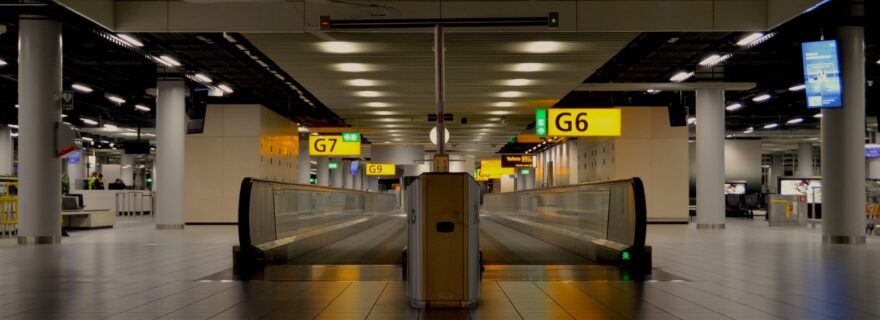From empty to over-congested airports: Schiphol’s passenger compensation scheme
Until very recently passengers were missing flights due to closed borders or positive COVID tests. Now, passengers might miss their flights, not due to pandemic measures, but due to poor airport management and labour practices.
Those who travelled during the COVID-19 pandemic will be no strangers to empty airports, where check-in and security queues were non-existent or limited to only a small group of passengers that chose to and were allowed to fly. Depressing images of deserted airports have disappeared, as most travel restrictions have been lifted globally and air traffic is increasing rapidly.
During the pandemic, in the absence of passenger demand and to mitigate economic challenges posed by the border closures, airports let go of their staff. This included security personnel, check-in personnel and ground handlers. Just as border closure measures were gradually being lifted at the beginning of 2022, staff that had been let go was not replaced. This meant that airports found themselves understaffed when it came to accommodating the ever-increasing passenger flows. The result was longer check-in and security queues for passengers, and overworked staff.
One such airport is Amsterdam Schiphol Airport in the Netherlands. Since May 2022, the chaotic organisation at Schiphol has led to many passengers spending hours in line for security checks. Although the main cause behind the chaos was the lack of workers, strike action held in protest against the working conditions at the airport in late April 2022 added fuel to the fire. In numerous instances, the long queues due to personnel shortages led to passengers missing their flights.
Traditional passenger compensation scheme linked to airline conduct
Under the European Union (EU) passenger protection rules, passengers are only entitled to compensation in three instances: if the airline cancels the flight; if the passenger is denied boarding at the gate; or if the flight is subjected to a long delay. In these instances, Regulation (EC) 261/2004 (hereinafter: Regulation 261) provides a legal framework, which allows passengers to seek compensation from airlines. However, passengers cannot seek compensation if they miss their flight due to external occurrences that are not linked to the airline. Under Regulation 261, compensation is given either for the non-performance of the contract in case of cancellation and denied boarding, or for the delayed performance of the contract in case of delay.
Schiphol’s novel compensation scheme due to airport conduct
To indemnify passengers who have missed their flights and have incurred additional costs owing to long queues at the security checkpoint, Schiphol has established a temporary scheme that allows passengers to seek compensation from the airport directly. The scheme was established in consultation with Consumentenbond, the Dutch Consumer Association, which was investigating how consumers that were affected by the queues could be disburdened. This scheme differs from the compensation system under Regulation 261, as there is no contract between the airport and the passenger similar to a ticket which would constitute a contract between the airline and the passenger. However, the rationale behind this compensation scheme is to provide an avenue for passengers, since those who have missed their flights due to long queues do “not have anyone to turn to at the moment”. Schiphol admitted that this was an undesirable situation for passengers.
How does Schiphol’s scheme work?
Under the given compensation scheme, passengers who missed their flight between 23 April and 11 August 2022 are entitled to claim compensation. By mid-August 2022, Schiphol had received 1,500 such compensation requests. The scope of the scheme was recently extended also for the period between 12 August and 31 October 2022. The extension was justified by the fact that there was still a shortage of security staff after the initial period of relief, and this had continued to create problems for passengers during that period.
The compensation scheme allows passengers to request a refund for the costs incurred when faced with the need to rebook flights or to arrange alternative transport. If a passenger missed their flight due to long airport queues, and eventually decided to take the train instead of a flight, they can receive full price compensation for the train ticket. It is also possible for passengers to request compensation for hotel accommodation that would have been used if they had not missed their flight (e.g. the first night at a hotel if the passengers missed their flight due to the queues and could not make it to their destination on the given day).
Schiphol also reserved the right to refuse compensation to passengers if the costs could have been limited or avoided in a reasonable manner by the passenger, if the passenger could have received compensation from another party, or if the claim is for non-monetary loss. Schiphol also deems the right to refuse compensation if it can determine that the passenger missed their flight due to “circumstances which are at the risk and expense of the passenger”, or if the request for compensation “was not made truthfully and in good faith”.
Passenger caps and the irony behind the practice
To prevent overcrowding, Schiphol eventually decided to instate a daily cap on the number of passengers that the airport would process, which was set at 69,500 passengers per day in October. As a result, certain airlines have had to cancel flights to comply with the cap, which may create a totally different problem in light of Regulation 261. However, Schiphol reportedly said that it would compensate airlines who comply with the cap. The establishment of a passenger cap seems ironic. After all, those same airports were recently petitioning for travel restrictions to be lifted to host more passengers and mitigate their economic losses. Now, the example of Schiphol shows that overpacked airports with unfavourable labour practices could also be a source of long-term economic loss.



0 Comments
Add a comment